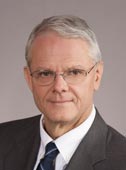Neurosurgical Mission to Ukraine

James Rutka
|
One of the foci of our Strategic
Plan (Transforming Surgery:
Beyond the Cutting Edge) is
to build upon our international
outreach and to strengthen our
partnerships regionally, nationally
and globally. I am very
proud of the fact that so many
of our faculty and residents are
already embedded in numerous
countries around the globe to
support this mission. Last year, I had the good fortune to
travel to Ukraine on a neurosurgical mission as part of a
Ukrainian Child Health Fellowship partnership between
Sick Kids Hospital at the University of Toronto, and
neurosurgical centres in Lviv and Kyiv. I was also very
fortunate to be accompanied by fellow neurosurgeon Dr.
Mark Bernstein, University Health Network, and Dr.
Myroslava Romach, Director of this Fellowship.
Ukraine was selected because it continues to develop
in technology and innovations in many scientific disciplines
including surgery. However, the country still
lags quite far behind in this regard, especially since it
only gained independence from Russia on August 24th,
1991. As such, we wanted to spend a good amount of
time in medical centres where there is considerable need.
Our mission took place June 15 – 23, 2013. Our first
destination was Lviv, a city of approximately 250,000
inhabitants in western Ukraine near its border with
Poland. At the Lviv City Clinical Children’s Hospital,
Mark and I gave a series of lectures on neurosurgical topics
for staff at the Hospital and from several surrounding
institutes. These lectures were delivered by us in English,
but were simultaneously translated into Ukrainian by
one of our host surgeons. We also attended the neurosurgery
clinic and saw numerous children in need of expert
neurosurgical care that sadly could not be performed at
the Lviv City Clinical Children’s Hospital because of
insufficient access to the required instrumentation and
equipment to perform the required procedures safely.
Many of these children would need to go to Kyiv, the
capital city, if their families could afford the expense of
travel and care at the National Neurosurgical Institute.
The next day, we prepared to assist our colleagues in Lviv
with a neurosurgical case they had not done previously,
but received permission to do while we were there: An
awake craniotomy on a 14 year old girl who had seizures,
and a left inferior frontal, language-area cystic tumour.
As Mark is one of the leading authorities in the world
on awake craniotomy and brain tumour resections, his
teachings and instructions were invaluable in giving our
host neurosurgeons the confidence to conduct this procedure.
Here it is important to point out that the neurosurgeons
at this hospital did not have many of the pieces
of equipment we take for granted nowadays, such as an
image guidance system and an operating microscope.
Nonetheless, Mark was able to coach our host neurosurgeons
through the craniotomy and tumour removal in a
flawless fashion. Thankfully, the teenage girl awakened
without any deficits, and her brain tumour turned out
to be a ganglioglioma, a benign tumour for which only
neurosurgical resection is required.
|
As part of this Ukrainian Child Health Fellowship, we
have encouraged Ukrainian surgeons to come to the
University of Toronto for extended observerships which
they have been keen to do. In fact, in the fall of 2013,
we welcomed 3 surgeons, 1 pediatric general surgeon,
1 pediatric neurosurgeon and 1 adult neurosurgeon
from Lviv and Kyiv to learn from our surgical services
at UHN and at SickKids. They learned a tremendous amount while here, and we have built up our relationships
with them during this time.

Surgical Mission to Ukraine - Mark Bernstein and Jim Rutka
Mark and I plan to return with additional colleagues in
May 2014 for another mission. As with so many of our
colleagues in the Department of Surgery who have given
of their time to reach out to countries and populations
in need, our mission to Ukraine will require continuous
and consistent communications, repeated visits to
Ukraine, and exchange of information and technologies.
International surgery is a critical component of our
Strategic Plan. We are in the midst of developing policies
by which surgeons who are devoted to International
Surgery can receive the necessary and deserved credit for
their creative professional activity scores at the time of
their annual assessments of productivity, and for their
promotion dossiers. In my opinion, these policies and
this type of recognition are long overdue.
James T Rutka,
RS McLaughlin Professor and Chair
|